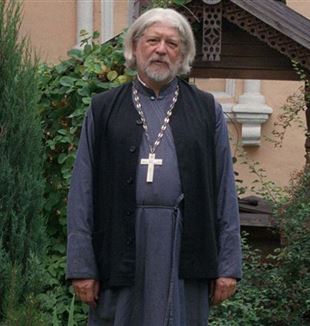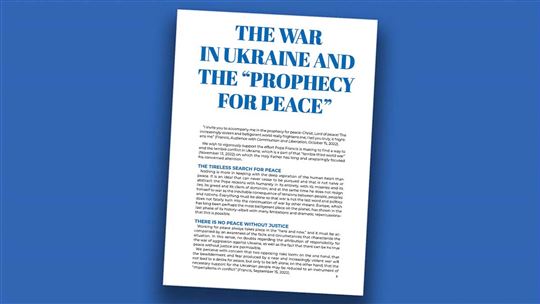
We can stop this war
"It seems that we are not able to influence the destinies of the world. But we have the Gospel." Aleksej Uminsky, Orthodox parish priest in Moscow, TV host, and editor of "Al'fa i Omega" magazine, shares his thoughts on the CL flyer on the war and peace.His Holiness Pope Francis has invited Christians to accompany him in his prophecy of peace. Since the time of the Sermon on the Mount, being peacemakers has become an inseparable part of our profession of faith. The Orthodox liturgy begins with words of peace, with the song of the angels who announced the Incarnation - "Glory to God in the highest, and on earth peace, goodwill toward men". The Eucharist, the center of the Church's life, invites all Christians to peace and to desire good. In the "Great Litany" the supplication for peace is encountered no less than four times, and these invocations are repeated several times throughout the liturgy. But not even this, in the Church's two-thousand-year history, has stopped Christians, who have taken up arms and justified warfare several times on the grounds of good and lofty purposes. From time to time, Christians call the borders of their own states "sacred," the territories in which they live "their own," completely forgetting that "The earth is the Lord’s, and everything in it, the world, and all who live in it" (Ps. 24), and that the Lord has not drawn borders on the map of the world.
His Holiness entrusts Christians with the task of seeking "a way to end the terrible conflict in Ukraine, which is part of that 'terrible third world war.'" But we are accustomed to the fact that the fate of the world is in the hands of world political leaders, of the "powerful of this world," who are often interested in solving global problems by force, by war, to whom the way proposed by the Gospel sounds ridiculous and inadequate. I am reminded of the words of a Serbian saintly bishop, Nikolai Velimirovič, about Mahatma Gandhi: "That is surely the meaning of the leader of the great Indian nation. Through that person, Providence is showing politicians and the statesmen of the world, even Christian ones, that there are other methods in politics than skill, wiliness and violence. Gandhi’s political method is very simple and obvious: he does not require anything except the man who cries out and the God Who hearkens. Against weapons, ammunition and army, Gandhi places fasting; against skill, wiliness and violence, prayer; and against political quarrel, silence.” (Nikolai Velimirovič, Missionary Letters, no. 88).
To us, ordinary people, it seems that we are not able to influence the destinies of the world. This is probably the case at a global level, but it suffices to just pay attention to the words of Pope Francis, who speaks of the need for dialogue, even when this dialogue "stinks," that is, it forces us to seek possible compromises to establish peace. In this case the Russian proverb is correct: a bad peace is better than a good discord. Wars not only bring death and destruction, they always create a frightening division between people, and multiply hatred. War is never a struggle between good and evil, war is always evil and often a crime. The war between good and evil is waged (Dostoevsky says this) on another battlefield, within the human heart. And today we see this war not only in the places where it is fought, but also among those closest to us, between members of the same family, between members of the same parish, the same Church.
Those who support the so-called "special military operation," induced by TV propaganda and false patriotism, and those who intervene to condemn it are at the mercy of mutual hatred, mutual curses. But we can stop this war. We have the words of the Gospel that are able to heal us and make us peacemakers, at least reaching out a hand, initiating dialogue with those who seem unworthy of it. We must understand that with war and hatred in our hearts we cannot go to church during the liturgy. It is not an easy path, it demands a lot of inner work from every Christian, patience, the ability to welcome the other despite all the horror of what is happening. That is where peace-building begins, and the participation in the mission that Pope Francis has called prophecy of peace.#prophecyforpeace